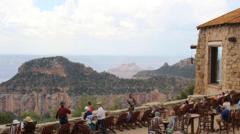Greece's iconic Acropolis has suspended operations this Tuesday due to an unprecedented heatwave, with temperatures peaking at 42C (107F) in certain areas. The closure, lasting from 13:00-17:00 local time, reflects ongoing heat-related challenges across Europe, where wildfires have surged and emergency measures have been enforced.
Acropolis Halts Operations Amid Severe Heatwave in Greece

Acropolis Halts Operations Amid Severe Heatwave in Greece
As extreme temperatures soar, Greece's Acropolis temporarily shuts down, raising concerns over visitor and worker safety.
The Acropolis, a significant cultural landmark in Athens, was closed during peak heat hours as announced by the culture ministry. This precaution comes as the nation faces extreme temperatures, with 38C expected in the capital on that day. Previous closures have also occurred during high-temperature conditions in June and July.
Officials cited worker and visitor safety as the primary reason for the closure, with an average of 4.5 million visitors expected in 2024. In response to the sweltering weather, the labour ministry has mandated a five-hour work halt for outdoor manual workers amid the hottest hours, particularly in regions like Attica and the Peloponnese.
The heatwave is anticipated to extend into Wednesday, although some relief is expected by Thursday. Meanwhile, Greece's fire service reported 41 wildfires erupting on Monday, with active blazes still ongoing in several areas. A category four wildfire alert was issued for regions most at risk, urging the public to stay vigilant.
Elsewhere in Western Europe, wildfires are also affecting several regions, including southwestern France and Spain's Catalonia. The Mediterranean countries are grappling with devastating heatwaves, prompting evacuations and significant property damage. The UN warns that such severe weather occurrences are likely to increase due to climate change, raising further concerns for the future.
Officials cited worker and visitor safety as the primary reason for the closure, with an average of 4.5 million visitors expected in 2024. In response to the sweltering weather, the labour ministry has mandated a five-hour work halt for outdoor manual workers amid the hottest hours, particularly in regions like Attica and the Peloponnese.
The heatwave is anticipated to extend into Wednesday, although some relief is expected by Thursday. Meanwhile, Greece's fire service reported 41 wildfires erupting on Monday, with active blazes still ongoing in several areas. A category four wildfire alert was issued for regions most at risk, urging the public to stay vigilant.
Elsewhere in Western Europe, wildfires are also affecting several regions, including southwestern France and Spain's Catalonia. The Mediterranean countries are grappling with devastating heatwaves, prompting evacuations and significant property damage. The UN warns that such severe weather occurrences are likely to increase due to climate change, raising further concerns for the future.



















